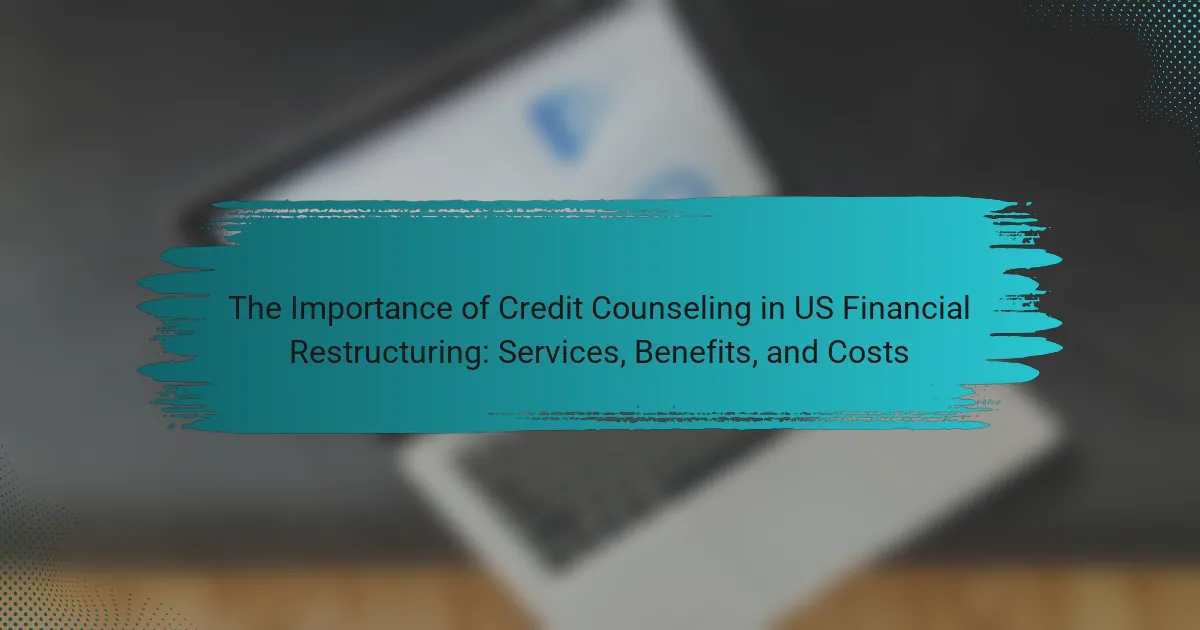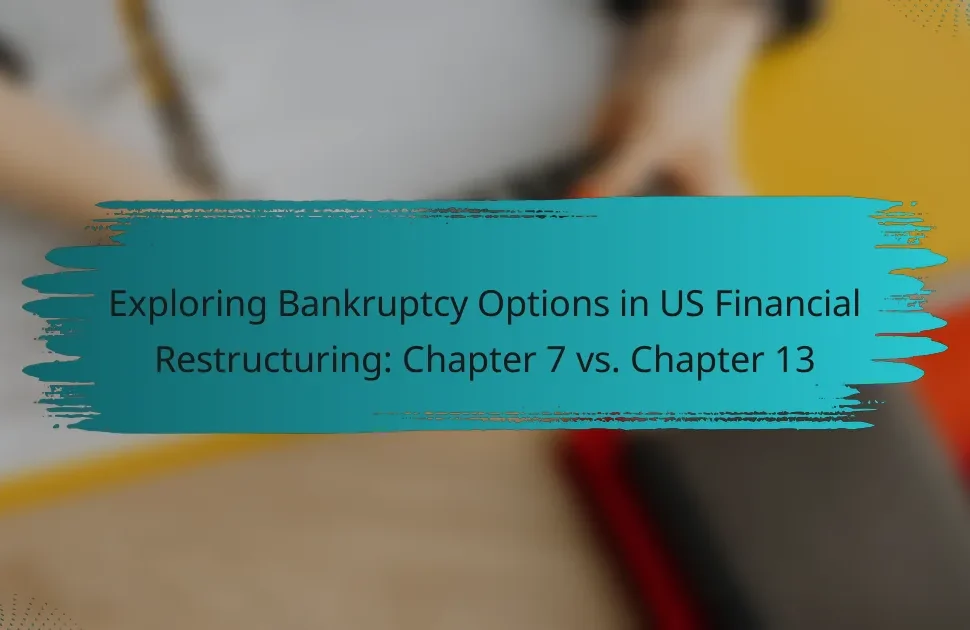Credit counseling is a service designed to assist individuals in managing debt and enhancing their financial stability. It involves personalized assessments of financial situations, guidance on budgeting, and strategies for debt repayment, including negotiations with creditors. The article explores the significance of credit counseling in the context of financial restructuring in the U.S., detailing its benefits such as improved credit scores, reduced financial stress, and enhanced financial literacy. Additionally, it addresses the cost of credit counseling services, which can vary widely based on the provider and the complexity of the client’s financial circumstances. Overall, credit counseling serves as a crucial resource for those seeking to regain control over their finances.

What is Credit Counseling and Why is it Important for Financial Restructuring?
Credit counseling is a service that helps individuals manage their debt and improve their financial situation. It provides guidance on budgeting, debt repayment, and financial planning. Credit counselors assess a client’s financial status and create a personalized plan. This plan often includes negotiating with creditors for lower interest rates or payment plans.
Credit counseling is important for financial restructuring because it offers a structured approach to debt management. It equips individuals with the knowledge to make informed financial decisions. According to the National Foundation for Credit Counseling, clients who engage in credit counseling often see an improvement in their credit scores. This can lead to better interest rates on loans and improved financial stability.
How does credit counseling fit into the broader context of financial restructuring?
Credit counseling plays a crucial role in financial restructuring. It provides individuals with guidance on managing debt and improving financial health. Credit counselors assess a client’s financial situation and create personalized plans. These plans often include budgeting strategies and debt repayment options. By helping clients understand their financial standing, credit counseling facilitates informed decision-making. This process can lead to debt consolidation or negotiation with creditors. Research shows that clients who engage in credit counseling are more likely to achieve financial stability. Overall, credit counseling is an essential component of effective financial restructuring efforts.
What are the primary goals of credit counseling in financial restructuring?
The primary goals of credit counseling in financial restructuring are to educate clients about managing their finances and to develop a personalized repayment plan. Credit counseling aims to help individuals understand their financial situation clearly. It provides guidance on budgeting and spending habits. This service assists clients in negotiating with creditors for better repayment terms. Additionally, credit counseling helps prevent future financial issues by instilling good financial practices. According to the National Foundation for Credit Counseling, effective credit counseling can lead to a significant increase in financial literacy among clients.
How does credit counseling differ from other financial services?
Credit counseling differs from other financial services by focusing specifically on helping individuals manage their debt and improve their credit. Unlike traditional financial services, which may include banking or investment advice, credit counseling provides tailored guidance on budgeting and debt repayment strategies. Credit counselors assess clients’ financial situations and create personalized plans to address their unique challenges. They often negotiate with creditors on behalf of clients to secure more favorable payment terms. This service is typically non-profit and aims to educate clients about financial literacy. In contrast, other financial services may prioritize profit over client education and support. Studies show that individuals who engage in credit counseling are more likely to successfully manage their debts compared to those who do not seek such assistance.
What services are typically offered by credit counseling agencies?
Credit counseling agencies typically offer services such as budget counseling, debt management plans, and financial education. Budget counseling helps clients create a personalized budget to manage their finances. Debt management plans allow clients to consolidate debts and negotiate lower interest rates with creditors. Financial education includes workshops and resources on managing credit and improving financial literacy. Many agencies also provide credit report reviews and advice on improving credit scores. These services aim to empower individuals to achieve financial stability and reduce debt.
What types of counseling sessions are available to consumers?
Consumers can access various types of counseling sessions. These include individual counseling sessions, group counseling sessions, and online counseling sessions. Individual counseling focuses on personalized financial advice. Group counseling allows consumers to learn from shared experiences. Online counseling provides flexibility and convenience for remote consumers. Each type aims to address specific financial challenges. The effectiveness of these sessions is supported by numerous consumer testimonials and research findings.
How do debt management plans work in conjunction with credit counseling?
Debt management plans (DMPs) work alongside credit counseling by providing structured repayment strategies for individuals with debt. Credit counseling involves assessing a client’s financial situation and educating them on managing debt. Counselors create a personalized plan, which may include a DMP.
A DMP consolidates multiple debts into one monthly payment, often with reduced interest rates. This arrangement is negotiated by the credit counseling agency with creditors. Clients make a single payment to the agency, which then distributes funds to creditors.
Research shows that individuals who utilize DMPs through credit counseling often experience improved financial stability. According to the National Foundation for Credit Counseling, 70% of clients report being debt-free within five years after completing a DMP. This highlights the effectiveness of combining credit counseling with DMPs for achieving financial goals.

What are the benefits of credit counseling for individuals facing financial difficulties?
Credit counseling provides individuals facing financial difficulties with essential support and guidance. It helps them understand their financial situation and develop a realistic budget. Counselors can negotiate with creditors on behalf of clients, potentially lowering interest rates or monthly payments. This service often leads to a structured repayment plan, making debt more manageable.
Additionally, credit counseling offers educational resources to improve financial literacy. Individuals learn about credit scores, debt management, and budgeting techniques. Studies indicate that those who undergo credit counseling are more likely to improve their financial habits. The National Foundation for Credit Counseling reports that clients often experience reduced stress related to financial issues. Overall, credit counseling serves as a vital tool for individuals seeking to regain control of their finances.
How can credit counseling improve an individual’s financial literacy?
Credit counseling can significantly enhance an individual’s financial literacy. It provides education on budgeting, managing debt, and understanding credit scores. Counselors offer personalized advice tailored to individual financial situations. This guidance helps clients make informed decisions about their finances. Studies show that participants in credit counseling programs report improved financial knowledge. For instance, a report by the National Foundation for Credit Counseling found that 73% of clients felt more confident in managing their finances post-counseling. Additionally, credit counseling often includes resources for ongoing financial education, reinforcing learned concepts. Overall, the structured support from credit counselors fosters a deeper understanding of financial management.
What specific skills do clients gain through credit counseling?
Clients gain financial management skills through credit counseling. They learn budgeting techniques to effectively allocate their income. Clients also develop skills in negotiating with creditors. This includes understanding their rights and options during debt discussions. Additionally, they gain knowledge about credit reports and scores. This knowledge helps them improve their creditworthiness over time. Clients receive guidance on creating long-term financial plans. These plans assist in achieving financial stability and avoiding future debt. Overall, credit counseling equips clients with essential tools for managing their finances effectively.
How does credit counseling help in reducing debt levels?
Credit counseling helps reduce debt levels by providing structured financial guidance. Counselors assess an individual’s financial situation, including income and expenses. They create personalized budgets to manage spending effectively. Credit counseling also offers education on debt management strategies. This includes negotiating lower interest rates with creditors. Many credit counseling agencies provide debt management plans to consolidate payments. Participants often experience reduced monthly payments and fees. Research shows that individuals who engage in credit counseling can decrease their debt by an average of 30%.
What emotional and psychological benefits can be derived from credit counseling?
Credit counseling provides significant emotional and psychological benefits. It reduces anxiety related to financial stress. Individuals often feel overwhelmed by debt. Credit counseling offers a structured plan to manage this debt. This clarity fosters a sense of control over finances.
Moreover, credit counselors provide emotional support. They help clients navigate their feelings about money. This support can enhance self-esteem and confidence. Clients often report feeling less isolated in their struggles.
Additionally, credit counseling can lead to improved mental health. Studies show that financial stability correlates with lower levels of depression and anxiety. A comprehensive approach helps individuals feel empowered to make better financial decisions.
How does credit counseling alleviate stress related to financial issues?
Credit counseling alleviates stress related to financial issues by providing expert guidance and support. It helps individuals understand their financial situation better. Counselors assess debts, income, and expenses to create personalized plans. These plans often include budgeting strategies and debt management options. By having a clear plan, clients feel more in control of their finances. This reduces anxiety associated with uncertainty and overwhelming debt. Additionally, credit counseling can negotiate with creditors to lower payments or settle debts. Such interventions can lead to a more manageable financial situation, further easing stress. Statistics show that individuals who engage in credit counseling often report improved financial stability and reduced stress levels.
What role does support play in the counseling process?
Support is essential in the counseling process as it fosters a safe environment for clients. This environment encourages open communication and trust. Clients feel more comfortable sharing their financial struggles when they perceive support. It also enhances their motivation to engage in the counseling process. Studies show that clients who receive emotional and practical support are more likely to achieve their financial goals. Support can come from counselors, peers, or family members. This collective encouragement helps clients navigate their financial challenges effectively. Ultimately, support plays a crucial role in promoting positive outcomes in credit counseling.

What are the costs associated with credit counseling services?
Credit counseling services typically range from free to several hundred dollars. Non-profit agencies may offer services at no cost or for a nominal fee. For-profit agencies often charge fees that can range from $50 to $300. Some agencies may also charge monthly fees for ongoing support. The costs can vary based on the complexity of the client’s financial situation. Additionally, some credit counseling services may offer sliding scale fees based on income. Research indicates that many individuals find value in these services, which can lead to better financial outcomes.
How do the costs of credit counseling vary across different agencies?
Costs of credit counseling vary widely among different agencies. Some agencies charge fees based on income, while others have fixed rates. Non-profit agencies often offer lower fees compared to for-profit ones. Typical costs range from free services to several hundred dollars for comprehensive plans. According to the National Foundation for Credit Counseling, fees can be as low as $0 to $75 for initial consultations. Additional services may incur extra charges, depending on the agency’s pricing structure. The variation reflects differences in service offerings and organizational goals.
What factors influence the pricing of credit counseling services?
The pricing of credit counseling services is influenced by several factors. These include the complexity of the client’s financial situation, which may require more extensive counseling. The geographic location also plays a role, as costs can vary by region. The reputation and experience of the counseling agency can affect pricing as well. Agencies with a long history and proven success may charge higher fees. Additionally, the type of services offered, such as debt management plans or educational workshops, can impact costs. Non-profit organizations may provide services at reduced rates compared to for-profit firms. Finally, regulatory requirements in different states can also influence pricing structures.
Are there free credit counseling options available for consumers?
Yes, there are free credit counseling options available for consumers. Non-profit credit counseling agencies often provide these services at no cost. They offer financial education, budgeting assistance, and debt management plans. Many of these agencies are accredited and can help consumers navigate their financial challenges. The National Foundation for Credit Counseling (NFCC) lists reputable agencies that offer free services. Consumers can access these resources online or through local community organizations.
What are the potential hidden costs or fees in credit counseling?
Potential hidden costs or fees in credit counseling include setup fees, monthly service fees, and additional charges for specific services. Some agencies may charge fees for educational materials or workshops. Other costs can arise from missed payments or late fees associated with debt management plans. Certain credit counseling organizations may also impose fees for credit reports or credit monitoring services. Transparency about these costs is not always guaranteed, making it essential to inquire upfront. According to the National Foundation for Credit Counseling, clients should always request a detailed fee structure before proceeding.
How can consumers identify and avoid unnecessary charges?
Consumers can identify and avoid unnecessary charges by reviewing their financial statements regularly. This includes checking bank statements, credit card bills, and any subscription services. They should look for unfamiliar transactions or recurring charges that they did not authorize. Setting up alerts for transactions can help in monitoring spending patterns. Additionally, consumers should read the terms and conditions of services they use to understand potential fees. Utilizing budgeting tools can also assist in tracking expenses. A study by the Consumer Financial Protection Bureau shows that regular monitoring can significantly reduce unexpected charges.
What should consumers consider when choosing a credit counseling agency?
Consumers should consider the agency’s accreditation and reputation when choosing a credit counseling agency. Accredited agencies often adhere to industry standards. Consumers should also evaluate the services offered, such as debt management plans and budgeting assistance. Transparency in fees is crucial; agencies should disclose all costs upfront. Additionally, check if the agency provides personalized counseling tailored to individual financial situations. Read reviews and testimonials from previous clients to gauge effectiveness. It’s important to confirm that the agency offers ongoing support and education. Lastly, ensure that the agency has certified counselors with relevant experience.
What questions should individuals ask before committing to a credit counseling service?
What fees do you charge for your services? Understanding fees is crucial to avoid unexpected costs. Are your services free or do you charge a fee? What services are included in your fee structure? Clarifying this ensures transparency.
What qualifications do your counselors have? Certified credit counselors should have relevant certifications. This can include certifications from organizations like the National Foundation for Credit Counseling (NFCC).
What is your approach to credit counseling? Different agencies may have varied methodologies. It’s important to know if they offer personalized plans or standardized solutions.
Can you provide references or testimonials? Hearing from past clients can validate the agency’s effectiveness. Look for independent reviews to assess their reputation.
What is the expected timeline for seeing results? Understanding the timeframe helps set realistic expectations. A credible agency should provide a clear outline of the process.
Do you offer additional financial education resources? Access to workshops or online materials can enhance financial literacy. This is important for long-term financial health.
What happens if I cannot keep up with the plan? Knowing the agency’s policies on missed payments is essential. This can impact your financial recovery journey.
Are you accredited by a recognized organization? Accreditation can indicate quality and adherence to standards. Look for endorsements from reputable financial organizations.
How can one verify the legitimacy and credentials of a credit counseling agency?
To verify the legitimacy and credentials of a credit counseling agency, check for accreditation from recognized organizations. Agencies should be accredited by the National Foundation for Credit Counseling (NFCC) or the Financial Counseling Association of America (FCAA). Review their website for transparency about services and fees. Look for client testimonials and reviews to gauge effectiveness. Confirm their compliance with the Credit Repair Organizations Act (CROA). Research their standing with the Better Business Bureau (BBB) for any complaints. Finally, ensure they provide certified credit counselors who meet industry standards.
What are the best practices for maximizing the effectiveness of credit counseling?
The best practices for maximizing the effectiveness of credit counseling include choosing a reputable agency, actively participating in sessions, and setting specific financial goals. A reputable agency should be accredited and have certified counselors. Active participation ensures individuals engage with the process and understand their financial situation. Setting specific financial goals provides a clear direction for counseling. Regularly reviewing progress with the counselor helps maintain accountability. Utilizing educational resources offered by the agency enhances financial literacy. Following a personalized budget plan created during counseling can lead to better financial management. Lastly, maintaining open communication with the counselor allows for adjustments based on changing financial circumstances. These practices collectively enhance the overall effectiveness of credit counseling.
Credit counseling is a vital service that assists individuals in managing debt and improving financial health through personalized guidance on budgeting, debt repayment, and financial planning. The article explores the significance of credit counseling in the context of financial restructuring, detailing its role in educating clients, developing tailored repayment plans, and negotiating with creditors. It also examines the various services offered by credit counseling agencies, the emotional benefits of seeking help, and the costs associated with these services. Key insights include the impact of credit counseling on financial literacy and the importance of selecting a reputable agency to maximize effectiveness.




